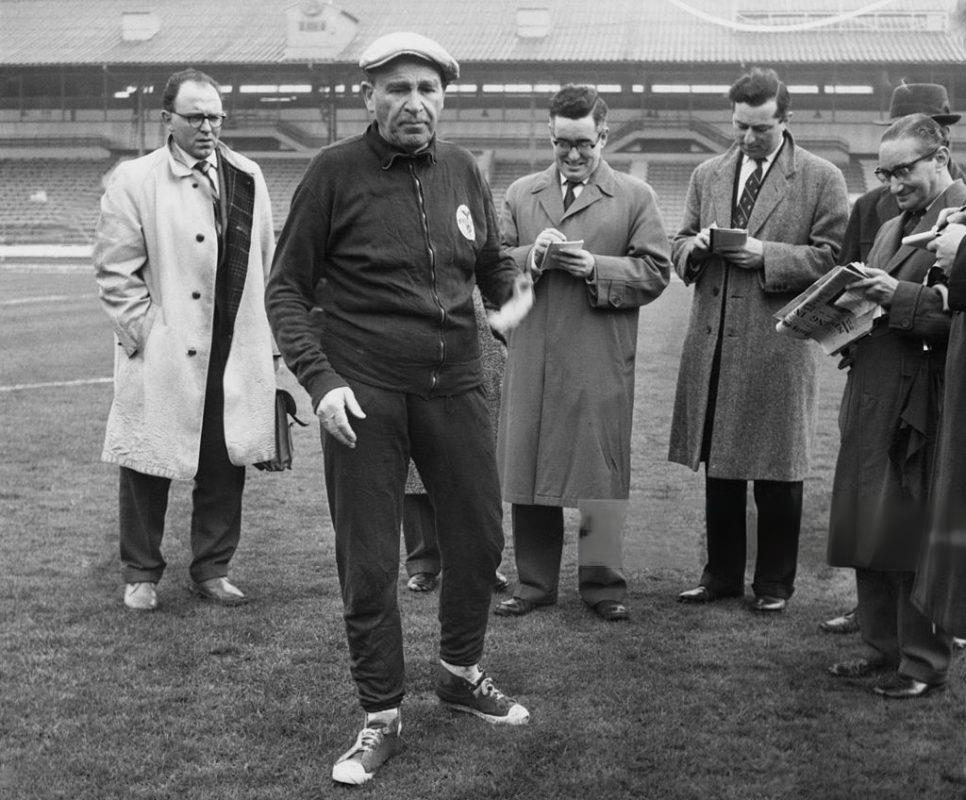In the realm of football history, few tales captivate and mystify as much as the enigmatic Benfica curse. The mere mention of this curse evokes intrigue and curiosity. Throughout this article, we will delve into the fascinating narrative surrounding the curse, exploring its origins, notable instances, and the profound impact it has had on Benfica, one of Portugal’s most prestigious football clubs. Join us on this captivating journey as we attempt to unravel the truth behind the mysterious Benfica curse and its lasting repercussions.

The Enigmatic Figure: Bela Guttmann
Bela Guttmann, a Hungarian-born football coach, etched his name into the annals of football history through his remarkable achievements and distinctive coaching style. Born on January 27, 1899, in Budapest, Guttmann embarked on a path that would forever leave an indelible mark on the sport. His tactical prowess and ability to inspire players propelled him to the forefront of football management during the mid-20th century.

The Origins of the Benfica Curse
Legend has it that the Curse of Bela Guttmann originated during his tenure as the manager of Benfica, a prestigious Portuguese football club, in the early 1960s. As the story goes, Guttmann led Benfica to two consecutive European Cup victories in 1961 and 1962. However, a contract dispute ensued between Guttmann and the club’s board after the second triumph. It is said that Guttmann, angered by the board’s refusal to meet his demands, proclaimed a curse that would haunt the club for the next 100 years.
Since the proclamation of the Benfica curse, the club has been plagued by a series of unfortunate events, leading many to believe in its existence. Let’s explore some of the most significant instances that have perpetuated the belief in the curse.
Unveiling the Benfica Curse: Notable Instances

One striking element of the curse is Benfica’s string of final defeats and near-misses in various competitions. After Guttmann’s departure, the club reached the European Cup final on multiple occasions but agonizingly fell short each time. The years 1963, 1965, 1968, 1988, 1990, and 2013 saw Benfica’s dreams of European glory shattered, fueling the perception of the curse’s influence.
Another undeniable aspect of the Benfica curse is the club’s prolonged drought in winning the Portuguese league title. Between 1994 and 2005, Benfica failed to secure the coveted championship, despite their historical dominance. Many supporters attribute this barren spell to the enduring effects of the curse.
Legend has it that the Curse of Bela Guttmann originated during his tenure as the manager of Benfica, a prestigious Portuguese football club, in the early 1960s. As the story goes, Guttmann led Benfica to two consecutive European Cup victories in 1961 and 1962. However, a contract dispute ensued between Guttmann and the club’s board after the second triumph.
It is said that Guttmann, angered by the board’s refusal to meet his demands, proclaimed a curse that would haunt the club for the next 100 years.
The Impact on Benfica and Beyond
The Benfica curse has had a profound impact not only on the club but also on the wider football community. Its influence extends to other clubs who fear the repercussions of crossing paths with this infamous hex.
Several clubs have found themselves entangled in the web of the Benfica curse and have actively sought ways to break free from its grip. These clubs, burdened by their misfortunes, have embarked on unique methods and rituals in their quest to reverse the perceived curse’s effects.
Beyond the tangible consequences, the Benfica curse has had a significant psychological impact. It instills doubt, fear, and a sense of resignation among players, managers, and fans. The weight of history and the belief in the curse can create a self-fulfilling prophecy, influencing match outcomes and perpetuating a cycle of defeat.
Debunking the Curse: Rational Perspectives
While the allure of the Benfica curse is undeniably intriguing, it is crucial to approach the topic with rational analysis. Skeptics assert that they can explain the misfortunes attributed to the curse through statistical probabilities, chance, and the complexities of football.
Some attribute Benfica’s final defeats, league title drought, and stadium incidents to statistical anomalies rather than a supernatural curse. With numerous clubs competing in European competitions and the unpredictability of domestic leagues, it is statistically probable for a club to experience a series of near-misses and periods of underachievement.
Critics of the curse theory emphasize the significance of sporting factors, such as managerial changes, player performances, financial constraints, and strategic decisions made within the club. They argue that these factors have a more substantial impact on a club’s success or failure than any alleged curse.
An Enduring Myth ?
In conclusion, the Benfica curse remains a captivating and enduring myth within football folklore. Whether viewed as supernatural or explained through rational perspectives, it continues to fascinate and influence the perceptions of fans and pundits alike. The tale of the Benfica curse serves as a reminder of the power of legends, the complexities of belief, and the unyielding passion that football evokes.
